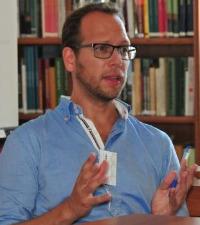

Position: Senior Research Fellow
Department: Contemporary History
Address: 1097 Budapest, 4 Tóth Kálmán Street
Room: B.5.40.
Phone: +36 1 224-6700/4670
Email:
QUALIFICATIONS
Habilitation in Literary Studies, Eötvös Loránd University (Budapest), Faculty of Humanities, 2020
Ph.D. in Comparative Literature, Eötvös Loránd University (Budapest), Faculty of Humanities, 2012
M. A. in History, Central European University (CEU), 2006
M. A. in Hungarian Literature and Linguistics, Eötvös Loránd University (Budapest), Faculty of Humanities, 2003
RESEARCH EXPERTISE
19-20th century, cultural history, intellectual history, migration history, Central and Eastern Europe
PROJECTS
The Post-1956 Refugee Crisis and Hungarian Émigré Communities during the Cold War (2020-2024)
This project aims to provide a systematic and comprehensive examination of one of the most significant refugee crises in Europe recently, the migration and subsequent fate of some two hundred thousand people who left Hungary in 1956/57 because of the Soviet invasion.
ÉMIGRÉ EUROPE - Civil Engagement Transfers between Eastern Europe and the Low Countries, 1933-1989 (2021-2023)
This project investigates how Eastern European émigrés affected the local communities they joined and what influence they had on social and religious movements, civil society and community values, reversing the traditional historiographical research concerns that primarily focus on migrant adaptation to their host societies. The project also focuses on the interactions between immigrant circles of diverse linguistic and national backgrounds. By bringing these aspects into focus, the project aims to reach a more subtle understanding of the emergence of a European culture of inclusivity and civil activism during the postwar period.
NEP4DISSENT - New Exploratory Phase in Research on Eastern European Cultures of Dissent (2017-2021)
This project’s Working Group 4: Cultural Memory of Dissent focused on exploring the cultures of remembrance of pre-1989 East European dissent across Europe. It examined the construction of the oppositional legacy through both official and alternative narratives; the attempts at integrating this legacy in the broader European culture of remembrance; and the contemporary uses of the dissident past within the EU and among its neighbors. Special attention was devoted to the guiding principles behind the preservation and digitization of the dissident heritage, the varied public functions of remembering dissent, and the role of transnational actors and networks in those activities.
This Horizon 2020 project explored the genesis and trajectories of private and public collections on cultural opposition movements in former socialist countries in Europe, with particular consideration given to how their transition from opposition to mainstream and private to public occurred; the political and social roles and uses of the collections before 1989 and since, and the efforts that have been made by national governments to preserve, maintain or add to them; the role of exiles in supporting, preserving and disseminating these collections beyond the Iron Curtain and back home, and the uses of collections that were created by the exile community; material culture represented by these documents, objects and audio-visual footage; the organization and the order of the collections as they are represented, particularly in the dataset and reference systems; the social background and life trajectories of the working staff of the collections; the sociology of institutions, stakeholders, their legal frameworks, financial backgrounds, ownership and management, the social and cultural composition of their audiences and the uses to which the collections are put in historical studies and culture; the networking and cooperative capacity of different types of collections.
COMPACT - Comparative Analysis of Conspiracy Theories in Europe (2016-2020)
The aim of this COST Action has been to develop a comparative and multidisciplinary approach to the research of conspiracy theories. This has involved comparing research on conspiracy theories in a range of cultures and regions, as well as different historical periods. The network has combined research from qualitative and quantitative approaches, including history, literary and cultural studies, sociology, politics, communication studies, anthropology, philosophy and psychology.
PUBLICATIONS
A complete list of publications: mtmt.hu
List of selected publications:
Eötvös Loránd Tudományegyetem (Budapest), Bölcsészettudományi Kar, magyar szak (2003)
Közép-európai Egyetem (Budapest), történelem szak (2006)
Habilitáció, Eötvös Loránd Tudományegyetem (Budapest), Bölcsészettudományi Kar (2020)
Ph.D., Eötvös Loránd Tudományegyetem (Budapest), Bölcsészettudományi Kar (2012)
ELTE Humántudományi Kutatóközpont Történettudományi Intézet (2016–)
ELTE Bölcsészettudományi Kar, Magyar Irodalom- és Kultúratudományi Intézet (2010–)
ELTE Bölcsészettudományi Kar, Történettudományi Doktori Iskola, témavezető
IAS, Indiana University, Bloomington, Egyesült Államok, 2022
Fulbright-ösztöndíjas, Stanford University, Egyesült Államok, 2019
Posztdoktori ösztöndíjas, Davis Center for Russian and Eurasian Studies, Harvard University, Egyesült Államok, 2018/2019
Vendégoktató, Babeș-Bolyai Tudományegyetem, Románia, 2013/2014
Junior posztdoktori ösztöndíjas, Imre Kertész Kolleg, Jena, Németország, 2012
Irodalomtörténet, szerkesztő (2007–2017)
Porównania/Comparisons, szerkesztőbizottság tagja (2021-)
20. századi kultúrtörténet és eszmetörténet; kulturális diplomácia; nemzetközi kapcsolatok; migráció; emigráció; menekültügy; államszocializmus és ellenzékiség; hidegháború; digitális bölcsészet
Az 1956 utáni menekültválság és a magyar emigráns közösségek a hidegháború idején (NKFI-FK-1 135586, projektvezető), 2020-2024
ÉMIGRÉ EUROPE - Civil Engagement Transfers between Eastern Europe and the Low Countries, 1933-1989 (CELSA, projektvezető), 2021-2023
COURAGE - Cultural Opposition: Understanding the Cultural Heritage of Dissent in the Former Socialist Countries (H2020, projektvezetőségi tag), 2016-2019
NEP4DISSENT - New Exploratory Phase in Research on Eastern European Cultures of Dissent (COST Action, munkacsoport vezetője), 2017-2021
COMPACT - Comparative Analysis of Conspiracy Theories in Europe (COST Action, irányító testület tagja), 2016-2020
Nem található a szűrési feltételeknek megfelelő eredmény. Kérjük, változtasson a kereső feltételeken.
Copyright © 2013–2026. All rights reserved.
Sitemap
